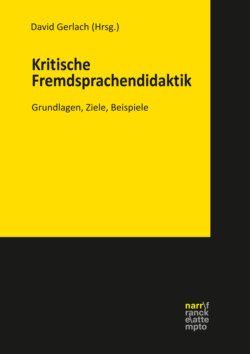Читать книгу Kritische Fremdsprachendidaktik - Группа авторов - Страница 33
На сайте Литреса книга снята с продажи.
1. Introduction: English Language Education as ‘Political Activity’ and ‘Moral Act’
ОглавлениеEducation is, in essence, both “a political activity” (Akbari 2008: 277) and “a moral act” (Jackson 2019: 144) and should enable young people to not just think critically, to reflect on society and their role within it, but it should also allow them to take a stance on their own rights and those of others – this also holds true for learning with literary texts in foreign language classrooms. Critical pedagogy aims to do just this and more, as it “seeks empowerment and social transformation” (Banegas/Villacañas de Castro 2016: 455). However, although aspects of critical theory have left a lasting effect on the German school curricula, critical pedagogy has yet to play a prominent role through binding curricular guidelines or regarding research within the field of English as foreign language education in general and in literature didactics in particular.1 Nonetheless, the German curricula for learning English at higher levels do entail aspects that appear to be closely related to critical pedagogy, if not in name but in spirit. Language education is envisaged to play a significant role in enabling students to achieve the so-called overall educational aims (allgemeine Bildungsziele), amongst which are political responsibility and independent critical judgment (cf. KMK 2005: 7). Hence, it seems that German foreign language education at an advanced level already relates to the classroom context and aims at “social transformation through education” (Akbari 2008: 276). The “questions of social justice and social change”, which are at the heart of critical pedagogy, are also the underlying questions of the compulsory topics within the English as a foreign language lessons. These include “political, social and cultural realities and their historical backgrounds” as well as “global challenges and visions of the future” (QUA-LiS 2020: 4-6), which serve as the basis for teaching, learning and assessing students at higher levels. Therefore, Ramin Akbari’s (2008: 278) concern that “language teaching is viewed mainly as cognitive activity with few socio-political implications” and that even “when the social dimensions of language are acknowledged, the social reality of language learning and teaching is represented from a narrow perspective where social context is only treated as who is talking about what”, does not appear to be relevant for the German context. Unlike in other cultural contexts, in which “coursebooks used for English instruction have been anesthetized to make them politically and socially harmless” (ibid.: 281), the curricular guidelines not only aim towards encouraging students to think, question, analyse, evaluate and discuss social realities. But, in line with Wolfgang Hallet (2002), they also encourage wide, multi-/intertextual and multimodal reading, including political texts, dystopian narratives and controversial texts, in order to challenge students’ own perspectives as well as consider someone else’s, thus fostering their ability to reflect on these complex processes in a critical way.
Working with fictional texts still remains at the heart of higher-level education in German secondary texts, as “literature learning invites safe, personally meaningful, and creative experimentation with feelings, ideas and language” (Delanoy 2013: 27). This is why this contribution will look closely at the ‘moral act’ of teaching and learning with literary texts to foster students’ critical literacies. Werner Delanoy’s (2013) approach to literature didactics, which in turn is influenced by transactional theory, forms the theoretical basis of this contribution. This concept of Reader Response Criticism is, on the one hand, “rooted in pedagogical concepts of Rezeptionsästhetik” (reception aesthetics; Delanoy 2013: 22), placing its focus on “the dialogue between literary text and their readers/learners” (ibid.). On the other hand, it is “influenced by power-critical positions with a dialogic agenda” (ibid.), which allows for the integration of concepts of critical pedagogy.
A further and interconnected issue raised here is that, while the curriculum does encourage critical thinking, it may not yet succeed in enabling students to develop the critical literacies they need to become politically responsible in today’s interconnected and fluid world (cf. Baumann 2012). To illustrate this, I will refer to the domain of “global challenges and visions of the future” (QUA-LiS 2020: 4-6), which has been compulsory for English at higher levels in North Rhine-Westphalia and other German federal states for over a decade now. Dealing with global issues has gradually become an integral element of teaching this subject: Not only is it one of the prominent languages in which global discourses are conducted, it also serves as an opportunity to critically reflect on the (use of) language itself. However, in line with De Lissovoy (2009) as well as Ulrich Beck (2010), it is not only important to encourage agency, to take part in the discourse about these challenges, but it is also essential to support our students in living together in a society that respects the dignity of others and to envisage and deal with what Beck calls ‘world risks’ (cf. Beck 2010, 2012). This might entail reframing the concepts of cultural learning and of critical pedagogy itself within the context of English language education.
This theoretical-conceptual article will first outline the educational guidelines at hand, paying special attention to the underlying concepts of political and cultural learning, before giving a practical outlook as to how critical literacies in the context of global issues could be fostered through learning with literature. It serves as an invitation to further discuss the role of critical literacies in literature learning and the importance of widening the theoretical framework towards global and cosmopolitan frameworks of education and to show how literature continues to “play a vital role in educating citizens of the world” (Nussbaum 2003: 88).
